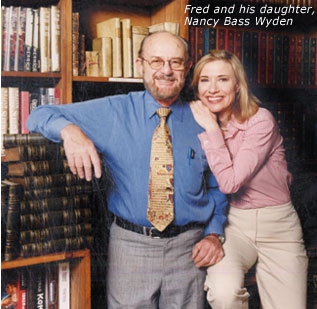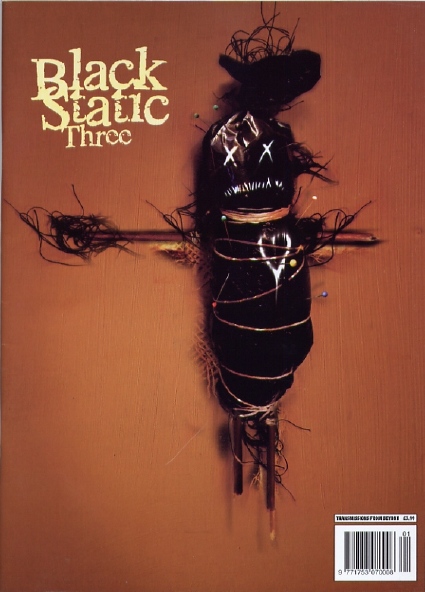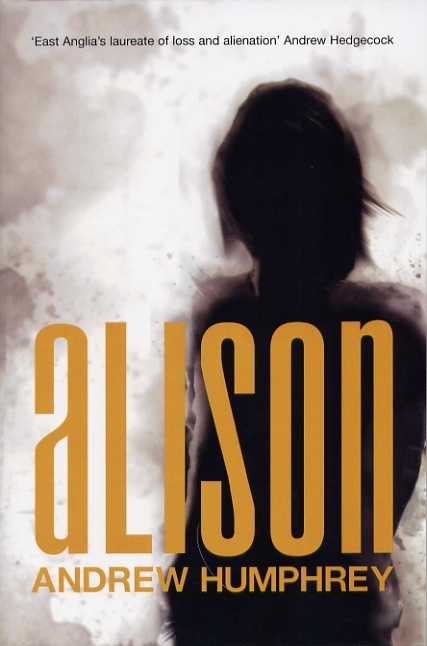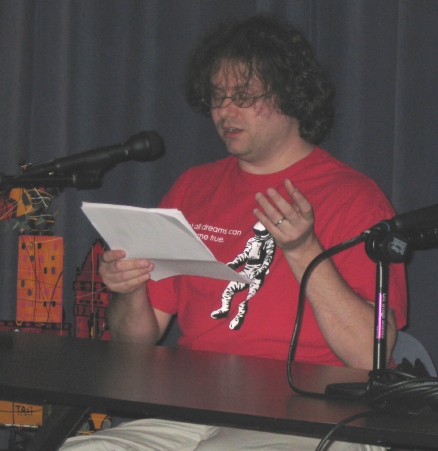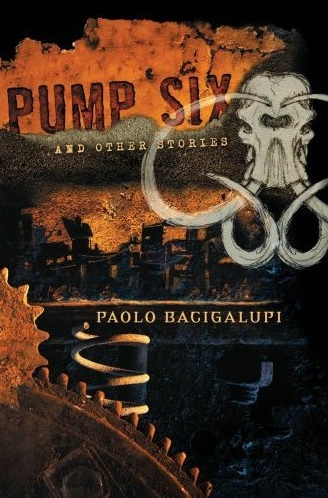|
|
|
|
This Just In...News
From The Agony Column
|
| |
|
03-23-08: Update: Link to NPR Story and Website
|
Not Crying Wolf Link to NPR Web Page
Today my story on Toby
Barlow's 'Sharp Teeth' aired on NPR.
Here's
a link to the page where you can use the EMail this Page button nesra the
top to email the page; please do so to as many
individuals as you can a separate button push for each person,
and you'll help support this site. It's the Agony Column version of
Pledge drive. NPR went all out for this and gave it a full
color web page with an excerpt from the novel. Read it, and ordewr the
book via NPR for extra extra points! Now, I'm off and I have some
incredible stuff I collected this weekend on a field trip. Look for it soon!
|
| |
|
03-21-08: NPR First Book Series, Toby Barlow (Really!) ; Agony Column Podcast
News Report : A Conversation With Nancy Bass Wyden of Strand Books,
NY
|
Presumably to
Air
 |
Yeah, I know, I'm
starting to sound like the boy who cried, "Wolf!" No pun
intended. Such is my state that I never even thought of the possibility
of there being a pun. But do note that while I'm once again told this
will run on Sunday, there's no guarantee. You can look here for updates,
and as soon as I know, you'll know. But Sunday has been the plan now
for a while; last week was a "pre-ponement"; the current
schedule is, I guess a "re-ponement." That said, here we
go again:
This Sunday, on Weekend
Edition Sunday, NPR will be broadcasting
my report on Toby Barlow and the rather odd journey he took
when he decided to write 'Sharp
Teeth', an epic story of werewolves in love in free verse. It features
excerpts from my interview with Barlow himself, and as well, Jennifer Barth,
his editor over at HarperCollins. This is a pretty interesting look inside
the world of publishing, from the time a writer with a truly unique idea
first sets pen to paper, or fingers to keyboard, through getting an agent,
selling the book to a publisher and seeing the book edited and brought to
the shelves. I'll podcast unedited versions of both interviews next week.
(Assuming the piece runs this week.)
Listeners who want to keep this little website going can help by going to
the NPR Weekend Edition Sunday Website on Sunday morning / afternoon and
using the "Email this Page" link on the URL that I'll provide.
If listeners email this page and it ends up in the Top
25 Most Emailed Stories, NPR continues to give me access to the writers
that you want to hear from. Your support of my work for NPR directly supports
this website, and is greatly appreciated. And heck, I hope you just enjoy
the story! If youre out there thinking about writing your first novel,
here's a look at somebody who did what youre doing and against all
odds succeeded.
And know I do appreciate your help with the Emailing this story dealie – that's
your best bet for supporting the site. It's cheaper than PayPal and more
secure. I'm sure you're all security-obsessed, right?
|
Agony Column
Podcast News Report : A Conversation With Nancy Bass Wyden of Strand
Books, NY : 23 Miles of Books
It's been about
20 years since I made my only journey to New York. At the time, I was
installing a Unix-based system for stock traders and the only places
I saw outside of the bowels of gosh, you know, I think it may have
been Bear-Stearns, were super-posh restaurants where my boss and I
attempted to run up the highest bills we could for dinner.
Thus I had no time at the time to check out what proves to be local landmark
bookstore, Strand Books. Fortunately for me, theyre still around after
all these years; in point of fact, they've been around for more than eighty
years. I was privileged to speak with Nancy Bass Wyden,
who with her father, Fred Bass, is currently running the store.
The Bass family story is remarkable in every way and inspiring in every way
a bookstore story can inspire. They've
got a huge web presence and some 23 miles of books. If you want to find
out what it takes to run a bookstore for three generations, this is your
chance; here's
the MP3 link. Beware that web site; theyve got their used books
and rare books online. Now it wont quite as fun as wandering through
the aisles, waiting for that moment of serendipity, but it could be equally
hazardous to your financial health.
|
| |
|
03-20-08: Black Static Three and Andrew Humphrey's 'Alison' ; Agony
Column Podcast News Report : Tim Pratt at SF in SF, March 16, 2008
|
Back to the
Best of the 80's With Third Alternative Press
|
|
To
die for – you decide how.
|
I know, you think
I've lost the path, what with all these non-genre entries popping in
and out of the column and the podcast. That's not the case, and I'm
here to remind you that what got me started in this biz twenty-something
annos ago was my discovery that the horror genre, which I'd sort-of
despised as utter trash, was actually becoming the home of some seriously
enjoyable literature. I recently unearthed a copy of Night Cry
Magazine while cleaning out the shelves, and thought, "I
wish they still made 'em like this."
Ask and ye shall receive – that day, Black Static Three and
'Alison' (Third Alternative Press ; March 2008 ; £9.99) by Andrew Humphrey
arrived and I remembered just why I'm here – because there's a lot
of stuff out there that you won't find on *.*.com, that's not going to show
up at Giant Friggin' Chain Acres O' Books, that's going to be tough to find
even at your independent genre fiction bookseller. With Andy Cox at
the helm, Third Alternative Press seems
to be single-handedly resurrecting the best of the 80's horror fiction boom,
and they're doing a fine job, both in periodical form – Black Static – and
in book form with Andrew Humphrey's 'Alison'.
If I'm going to read a magazine, it has to readable. I'm pickier these days
than I was back in the 1980's about that sort of thing. The same goes for
overall production values; I want a magazine that pretty much looks and feels
like a book, but is not a book. That is, I want a magazine with
the same level of attention to how it is produced as what you might find
in a decent small press book; good cover, good binding, thick paper. Black
Static Three has it all and it's all very nice; readable print, nice
paper, a cover that seems just a tad heavier than a cheapo magazine cover,
yet nonetheless belongs only on a magazine. Inside, Black Static Three delivers
cleanly-designed fiction and non-fiction with low-key B&W illustrations.
Of course all this would be for nought if the contents were like say, Wired,
which looks nice but these days is wall-to-wall advertisements for either
products or the hipness-quotient of those behind it.
The fiction content of Black Static Three is nicely varied. You have
the current-day dream-horror of "The Pit" by Alexander Glass; think
Poe informed by 21st-century medicine. Seth Skorkowsky's "The Mist of
Lichthafen" takes another tack. It's a gritty little tale with apparitions
and monsters in a fantasy setting. If you've ever taken acid in the deserts
of the southwestern USA, you might have had an experience like the "Rick" of
Tony Richards' "The Sentinels." I can't call it a good trip, but
it's a good story. Ian R. Faulkner turns in "The Difference Between," a
solid story with an effective World War I setting. Carole Johnstone offers
IrnBru and a bloody syringe for "The Morning After," which verges
on being a short-short. Urban themes persist and take a short trip into the
near-future with Will McIntosh's "The Fantasy Jumper." Matthew
Holness finishes the magazine with a grungy, grotty story titled "The
Toad and I." It's most unpleasant in a manner one inclined to read horror
might find particularly pleasant. All in all, no duds – Black Static
Three is a solid collection of dark fiction. I'd look for Tony Richards'
forthcoming novel from HarperCollins, and read any story by the other authors
that appeared in subsequent issues.
That leaves us to the non-fiction, which is plentiful and pretty stellar.
Tony Lee's "Blood Spectrum" is nice roundup of cheesy, low-budget
and big-budget horror movies; the sort of fun reading that prevents rational
thought. Highlander: The Source? Who knew? Stephen Volk offers a
venomous essay in defense of screenwriting in "Electric Darkness." Not
a review per se, just a nicely paced spew. One of my horror novelists, Christopher
Fowler takes the big-screen wretches to task in his column, "Interference." Even
a passing mention of Life on Mars merits passing mention here; Fowler
addresses "The Incredible Shrinking Brain" of the most recent regurgitation
of 'I Am Legend', and expresses enough admiration for Sweeney Todd that
I may bother to watch it someday. Probably not, but, there you go. And Peter
Tennant's "Case Notes" includes lots o' book reviews and an interview.
Lovely stuff, with some pointers towards books that are probably worth one's
valuable time. All in all, Black Static Three is worth your valuable
time – and money.
|
|
Unhappiness
as a form of love.
|
That leaves us with 'Alison' by Andrew Humphrey. The bottom line here is
a bit of psychological, relationship horror, super clean and nicely complex,
but not overblown. It's the short-novel equivalent of one of the stories
one might find in Black Static, setting up on the first page the
kind of situation that keeps you reading until you've turned the last page.
Chris and Alison, Spike and Emma. Somebody is going to die; others may live,
but not happily ever after. Here, prose and pacing carry the day. At 172
pages, it really is an all-nighter. Just dont plan on a big smiley
day afterwards, and if you're in a relationship that is troubled, maybe give
this one a pass until you're feeling good. 'Alison' belongs to that branch
of fiction that blurs horror and depression. Humphrey's sense of pacing and
revelation keeps things lively, but again, the slash-your-wrists-and-hope-to-die
school of fiction isnt for everyone. You were warned; and I hope heartened
by this blast from the past in the present. This is why I started reading
genre fiction again, so long ago. This is why it's worth reading. No, its
not all literature that will live forever. But it does live while you read
it. And perhaps you'll want to continue to live after reading it, just to
experience the highs of feeling low.
|
Agony Column
Podcast News Report : Tim Pratt at SF in SF, March 16, 2008 : Briefly
Interviewed
During the break
between the readings and the panel at SF
in SF, I took the time to speak with both authors. I just plugged
in a mic, let the feathers fly, mostly asking about the work each writer
read. Today's podcast is my chat with Tim Pratt. It's not an epic interview
in a sit-down studio; and that's why I like doing them this way. Quick
and dirty often yields decent results – or, at least, results
that are not overly long. Here's
the MP3 link; that will help you kill a few minutes. You can listen
to this instead of the unfolding horror-show of the US economic pericalypse
that came to pass Sunday evening. Hey, the end of the world happened
and nobody noticed because they were listening to Tim Pratt at SF in
SF. How cool is that?
|
| |
|
03-19-08: Mary Doria Russell Awakens 'Dreamers of the Day' ; Agony Column
Podcast News Report : Tim Pratt Reads 'Artifice and Intelligence' at
SF in SF on March 16, 2008
|
Yesterday's
Vacation, Today's World
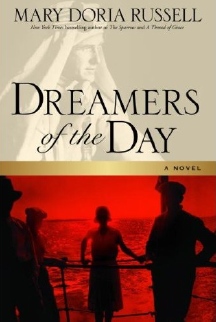 |
|
| Dream
or nightmare? |
We probably know Mary
Doria Russell best for her incredible, out-of-the-blue science
fiction novels 'The Sparrow' and 'Children of God'. But it was her
historical novel, 'A Thread of Grace' that got her the Pulitzer nomination.
I hope they didn't wear out the Pulitzer pen, because you could not
imagine a more relevant novel than 'Dreamers of the Day' (Random House
; March 11, 2008 ; $25), which does no less than examine the root of
pretty much everything that's sending this world to hell in a handbasket – the
modern map of the Middle East.
It's no secret that the countries we take for granted today were created
out of whole cloth by Winston Churchill, T. E. Lawrence ("Lawrence of
Arabia") and Lady Gertrude Bell. But we've not seen a concise, and rather
appropriately terrorizing vision of just how this happened, and that's precisely
what's on tap in Russell's latest. And if you remember the way 'The Sparrow'
handled the often-insane complications that result when politics and religion
collide, then you can understand why Russell is the perfect writer to tackle
this.
The setup is pretty simple; Agnes Shanklin has inherited enough money to
undertake her dream vacation. It's Egypt and the Holy Land for Agnes; for
us, it's the world we have come to inherit. She sets herself up in the Semiramis
Hotel shortly before those who would create the potential destruction of
our world arrive, and in the course of the novel meets the players while
she witnesses the real-life political version of science-fictional world-building.
Unaware of the consequences of what they are doing, the brilliant and powerful
muck it up like only the brilliant and powerful can.
Russell's a writer who can succinctly get to the heart of complex issues,
create intense and memorable characters and tell a hell of a good story in
the process. She's smart enough to know that evoking the power of the events
she's describing is by itself not enough, and she's able to deliver all the
elements required to pull off the challenge she sets for herself. And because
readers of SF like to have a bit of the unreal, they'll be pleased to know
that the narrator is no longer with us. No wonder she has such an excellent
perspective. Of course, if things persist on their current course, we could
all join her sooner rather than later. Let's hope that's not the case, but
if it is, well, those having read this book will be at the front of some
line. And that may be a good thing – kind of like the seat at the front
of the handbasket.
|
Agony Column
Podcast News Report : Tim Pratt Reads 'Artifice and Intelligence'
at SF in SF on March 16, 2008 : Taking Cues
Today's
MP3 podcast is Tim Pratt reading 'Artifice and Intelligence'
at the most recent SF in SF. He notes that the story was written
at the behest of his better half, who provided him with a series of
restrictions that he worked within. (He wasn't able to write a story
that involved time travel and a hippogriff; but I 'm sure some brave
soul out there will.) He also notes that he promised his wife half
the pay he got for any story that sold, and that he's paying her twice
for this one – it's been selected for Rich Horton's 'Year's Best'
anthology.
|
| |
|
03-18-08: Tim Pratt Transforms into T. A. Pratt : Agony Column Podcast
News Report : SF in SF March 16, 2008 : Tim Pratt Reads The River Boy
|
No Rest for
'Poison Sleep'
|
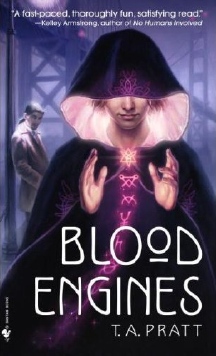
|
Not
your ususal work clothes. Not your usual work.
|
It's been too long
since I spoke with Tim Pratt about his excellent first
novel, 'The Strange
Adventures of RangerGirl' – long enough that he's won a passel
of awards and managed to start a new series writing as T. A. Pratt.
Last year, he introduced Marla Mason, a contemporary sorceress in 'Blood
Engines'. She's back again this year with 'Poison Sleep' (Bantam Spectra
/ Random House ; April 1, 2008 ; $6.99), and alas, while things may
be better in San Francisco, in her hometown of Felport, well, it's
a nightmare. Literally.
If sorceresses can have APB's, then Marla gets hers from Leda Husch who runs
the Blackwing Institute for the criminally insane, the Felport version of
Arkham Asylum. Fortunately, Elsie Jarrow's been "contained," and
the only escapee is Genevieve Kelley. She's just a dreamer – but unfortunately
powerful and with lots of potential to be manipulated. Marla and Rondeau
need to find her before she turns everything around her into the very bad
dreams of very bad people. Obviously, more than a few folks are going to
be seriously scathed.
So, heres the deal with Pratt's version of the contemporary urban
fantasy. Like 'The Strange Adventures of RangerGirl,' the Marla Mason books'
greatest strength is Pratt's ability to create complicated, realistic characters
whom he then promptly plunges into supernatural adventures. The supernatural
aspects are always entertaining, energetic and well described, but none of
that would matter a whit if his characters weren't so well grounded. And
it's not just the series characters who do well in these books. They're written
to be pretty much standalones, so the ancillary characters, the "one-offs," so
to speak, are as well-drawn as the continuing characters. Obviously, it's
best to read the books in the order written / published, but, that said,
you can pick them up however they come to you.
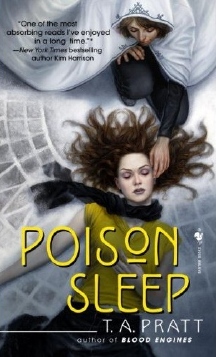 |
|
One of the reasons
is that Pratt is not a time waster or a tease, which is rare but exemplary
in this sort of fiction. He doesn't pussyfoot around. By the bottom
of the first page Marla is in full-force battle mode, dagger drawn,
with spells holding on the tip of her tongue. She doesn't find what
she expects, and neither will you. Pratt's a smart plotter and knows
pacing is critical in a paranormal thriller. When you keep the reader
breathless, the reader has no breath to ask questions. Pratt makes
effective use of the tools of a mystery writer; these books are in
effect mysteries with magic. His ability to provide a good superstructure
for the elements of the fantastic makes them seem more realistic, though
no less fantastic.
Pratt's novels are outstanding, but he's also an award-winning short story
writer. It
was a great pleasure to hear him read 'The River Boy' as the first of two
stories for the latest version of SF in SF, one you can experience when you
listen to this MP3. This is a powerful, short, lovely little fable written
while he awaited the birth of his first child – but it's definitely
no lullaby.
|
| |
|
03-17-08: A 2008 Interview with Paolo Bacigalupi and Jeremy Lassen
|
"Crossovers and Melding Points"
|
|
The
making of a book – let it win awards! |
Just before the last edition of SF in SF, I had the good fortune to speak
with Paolo Bacigalupi and his publisher, Jeremy
Lassen. Here's the great
success story – no, make that two great success stories not just
for readers of science fiction, but readers, plain and simple. The first
portion of the interview, I speak with Paolo about his themes, his methods
and his intentions behind the echo-themed stories he writes. They're
really rather remarkable, and they put me in mind of Andrew Kimbrell,
as Paolo puts into fiction what Kimbrell stays awake at night worrying
about.
But I also managed to talk to Jeremy Lassen about a very different ecology,
the business ecology that allows him to thrive in the midst of skyscraper
publishing like a Roundup-proof weed that gets stronger every time you
throw poison on it. Lassen find and exploits the niches ignored by the
Easy coast magnates, and he helps everybody in the process – writers,
especially readers and even the magnates who leave him the openings he
uses so well. Here's
the MP3. Now, short story writers of the world,
get out there and produce! These are your dreams made flesh. Well, some
of them.
|
| |
|
|





